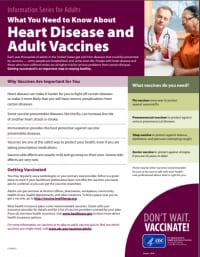What to know
- People with heart disease and those who have had a stroke are at higher risk of developing serious flu complications.
- Flu vaccination has been associated with lower rates of some cardiac events among people with heart disease, especially among those who have had a cardiac event in the past year.
- If you have heart disease or have had a stroke and you get flu symptoms, call your health care provider right away.
- CDC recommends prompt flu antiviral treatment for people with heart disease or who have had a stroke who have confirmed or suspected flu infection.

People at increased risk
Spotlight
Among adults hospitalized with flu during recent flu seasons, heart disease was one of the most common chronic (long-term) conditions—about half of adults hospitalized with flu have heart disease. Studies have shown that flu illness is associated with an increase in heart attacks and stroke. A 2018 study found that the risk of having a heart attack was 6 times higher within a week of a confirmed flu infection. These findings were most pronounced for older adults and those experiencing their first heart attack. Additionally, a 2020 study that looked at more than 80,000 U.S. adults hospitalized with flu over eight flu seasons (2010-11 through 2017-18) found that sudden, serious heart complications occurred in one out of every eight patients (~12% of patients).
What is heart disease?
Heart disease includes, but is not limited to, the following common conditions:
-Heart failure
-Hypertensive heart disease
-Pulmonary heart disease
-Heart valve disorders
-Arrhythmias including atrial fibrillation
-Congenital heart defects
Vaccination is the best protection against flu
Flu vaccination has been associated with lower rates of some cardiac events among people with heart disease, especially among those who have had a cardiac event in the past year
Types of flu vaccines for people with heart disease
- Flu vaccines are approved for use in people with heart disease and certain other health conditions. Flu vaccines have a long, established safety record in people with heart disease and those who have had a stroke and studies support the safety in people with these conditions.
- People with heart disease or history of a stroke should generally not get the nasal spray vaccine (i.e., the live attenuated influenza vaccine or LAIV).
There are several flu vaccine options available this season. Your doctor or other health care professional can answer any questions you might have about flu vaccine.
Pneumococcal vaccination is also important
- Having flu increases your risk of getting pneumococcal disease.
- Pneumococcal pneumonia is an example of a serious flu-related complication that can cause death.
- People who have heart disease should also be up to date with pneumococcal vaccination. This vaccination protects against pneumococcal pneumonia and other serious infections.
- You can get the pneumococcal vaccine your provider recommends when you get a flu vaccine.
- Talk to your health care provider to find out which pneumococcal vaccines are recommended for you.
Other preventive actions for people with heart disease or history of stroke
In addition to getting a flu vaccine, people with heart disease or who have had a stroke should take the same everyday preventive actions CDC recommends for everyone, including avoiding people who are sick, covering coughs and sneezes, and washing hands often. This also can include taking steps for cleaner air and hygiene practices like cleaning frequently touched surfaces.
Specific health actions for people with heart disease or history of stroke
- Plan ahead to maintain sufficient supplies of your regular medications for your chronic medical condition(s) (e.g., at least a two-week supply).
- Do not stop taking your regular medications without first consulting your health care provider, especially in the event that you become sick with flu or another respiratory infection.
- People with heart failure should be alert to changes in their breathing and should promptly report changes to their health care provider.
- If you have heart disease or have had a stroke and you get flu symptoms, call your health care provider right away.
- CDC recommends prompt flu antiviral treatment for people with heart disease or who have had a stroke who have confirmed or suspected flu infection.
Resources
Animated graphic

Factsheet

What You Need to Know About Heart Disease and Adult Vaccinations
